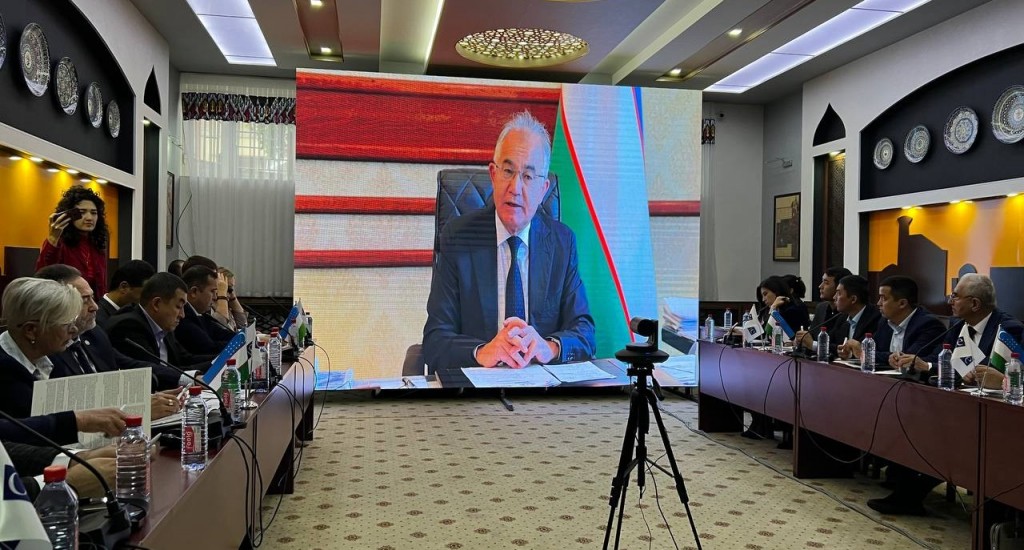- 4
- Nov
A round table on the OSCE Ljubljana Recommendations was held in Samarkand
Tashkent, Uzbekistan (UzDaily.com) – On 2 November, in the city of Samarkand, a round table was held on the topic "Ljubljana recommendations for the integration of diverse communities and the policy of Uzbekistan in the field of interethnic harmony."
The event was organized by the National Center for Human Rights of the Republic of Uzbekistan jointly with the Project Coordinator of the Organization for Security and Cooperation in Europe in Uzbekistan and the Office of the OSCE High Commissioner on Minorities.
The purpose of the event is to inform government bodies and civil society institutions about the guidelines and practical recommendations for the development and implementation of policies that support the integration of different societies. Today, interethnic relations, peace, mutual respect, development of national values are the main guarantees for the development of any democratic legal state and a strong civil society.
The event was opened by the First Deputy Speaker of the Legislative Chamber of the Oliy Majlis of the Republic of Uzbekistan, Director of the National Center for Human Rights Akmal Saidov, OSCE High Commissioner on Minorities Ambassador Kairat Abdrakhmanov and Head of the Office of the OSCE Project Co-ordinator in Uzbekistan Sergey Sizov.
A. Saidov noted that Uzbekistan is closely cooperating with the OSCE and its structures in matters of interethnic harmony and religious tolerance, as well as in other areas. Today in Uzbekistan, where representatives of more than 130 nationalities and peoples live, this issue is considered as one of the most urgent and strategic issues in the development of the state and society. Strengthening interethnic, interreligious harmony and solidarity, protecting the interests of all nationalities living in Uzbekistan, is one of the main directions of current reforms, as well as national legislation.
K. Abdrakhmanov expressed his deep gratitude for organizing a meeting with the President of the Republic of Uzbekistan Shavkat Mirziyoyev during his visit to Uzbekistan in June this year. Also, noting the integration policy of Uzbekistan, he recognized the importance of supporting the integration of different societies and the diversity of national cultures for the consistent development of the state, confronting external and internal threats, investing in integration policy.
The round table is dedicated to the “Ljubljana Recommendations”, which serve to ensure that every member of society today has a fully inclusive approach in all aspects of social, economic and political life.
According to S. Sizov, the experience of the OSCE participating States shows that a well-managed integration process is a prerequisite for building a just and strong society. In order to support the process of integration, States must pursue policies aimed at creating a society that respects diversity and that every individual, including all members of ethnic, linguistic, cultural or religious groups, contributes to the creation and maintenance of a common and inclusive civic identity.
Within the framework of the round table, attention was paid to the tasks arising from the “Ljubljana recommendations on the integration of various societies”, adopted by the OSCE in Ljubljana in 2012, their implementation, the main directions of the policy of interethnic harmony in Uzbekistan, the role of interethnic harmony in ensuring religious tolerance.
In this regard, the round table participants discussed the role of civil society institutions in policy implementation, the importance of public opinion in evaluating the effectiveness of reforms, the components of the regulatory framework for integration principles and policies, the best practices of some countries in this direction, priority features and difficulties in the integration process.
An international group of OSCE experts also took part in the round table with reports. In particular, the participants listened with great interest to the presentations by Anton Thomsen, Political Adviser to the OSCE High Commissioner on Minorities, Elzbieta Kujborska-Pach, Senior Adviser to the High Commissioner for Legal Affairs, and international expert Irene Kausar.
The round table discussed such topics as the principles of effective integration, the main directions of the policy of interethnic harmony in Uzbekistan, successful integration practices on the example of Estonia, the main elements and directions of integration policy, the importance of interethnic harmony in ensuring religious tolerance.
